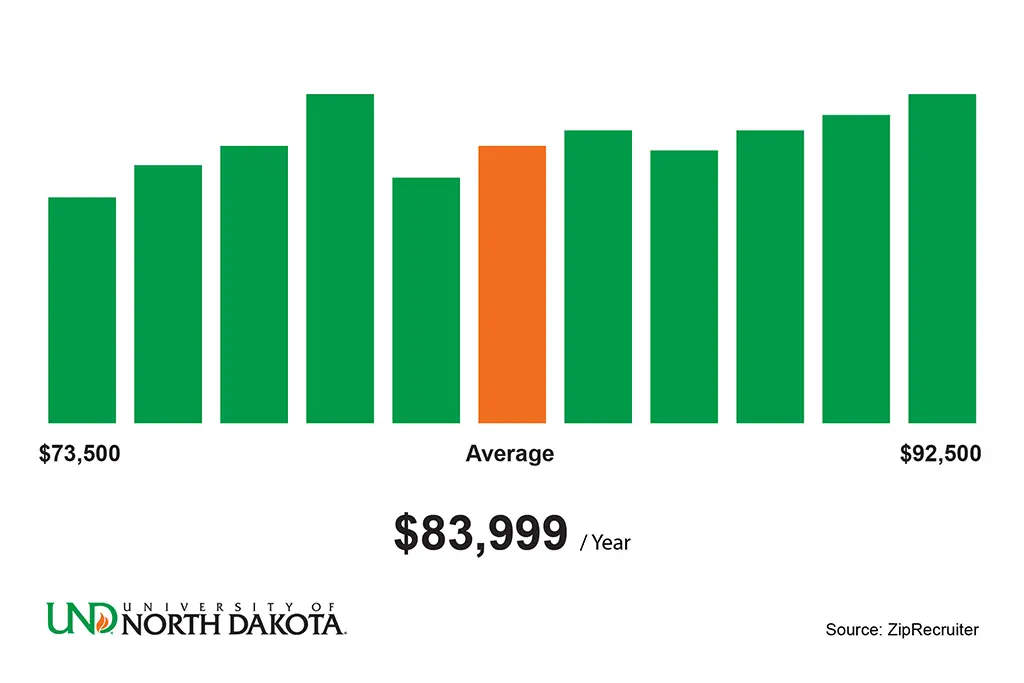
Is an MPA Degree Really Worth It? See Career Benefits
An MPA is worth pursuing because it equips graduates with valuable skills in policy and management, leading to rewarding career paths in multiple industries and offering a high return on investment.
Request Information
Did you know you can become a Secret Service agent with a Master of Public Administration degree? It might sound surprising, but this is actually just one of the many career paths open to MPA graduates.
While the MPA's versatility is impressive, it raises a big question for prospective students: Is an MPA worth it? For it to be, its value must surpass the sum of the effort, time investment, and tuition you pay for it.
The Value of an MPA Degree
Earning a Master of Public Administration (MPA) degree means equipping yourself with advanced knowledge and skills in the field of public administration. As a master's level program, UND's MPA curriculum is designed to mold capable, ethical leaders through courses such as:
- Research Methods
- Administrative Ethics in the Public Sector
- Public Budgeting and Financial Administration
- Program Evaluation
- Government and Business
- Public Personnel Administration
The value of an MPA degree stands in the exposure to specialized knowledge that has immediate applications in the field. Unlike undergraduate courses, which often emphasize general theories, an MPA allows students to learn the specificities of public administration, combining theory with hands-on skills and practical experience.
According to Anna Roaldson, a 2023 graduate and Unified Champion Schools Director at Special Olympics ND, the MPA program at UND facilitated a reciprocal learning environment where students could gain insights from peers with diverse backgrounds.
"Class discussions are often my favorite portions of the MPA courses, as I am able to learn from my peers who have more experience… those same peers have also often appreciated the insight that recent college graduates bring to class discussions."
The structure of UND's MPA program not only imparts technical skills but also builds an interactive, collaborative community where students grow through shared knowledge and experiences.
Is the MPA a Good Financial Investment?
Pursuing a master's degree is a significant financial commitment, with annual tuition costs ranging between $10,000 and $25,000 for many MPA programs. Although this may seem substantial, the potential salary range for MPA graduates, spanning from $73,500 to $92,500 with an average of $83,999, demonstrates a strong return on investment (ROI), making the degree a good financial investment.
Salary Range for an MPA Degree
Many graduates have found their degree to be financially rewarding upon joining the workforce. For example, Joshua Tetzlaff, a City Administrator and 2020 graduate, remarked that his MPA degree from UND "opened doors to jobs that would not have considered my application otherwise" and "helped [him] perform at a high level."
Because the skills acquired in an MPA program are highly valued across various sectors, the degree is a powerful asset for career advancement, which goes hand-in-hand with financial rewards.
Career Opportunities with an MPA
An MPA degree provides access to a range of career opportunities. Graduates can find suitable positions in public administration, human resources, healthcare, city and county administration, nonprofit management, and even management consulting, among many other sectors.
An MPA also opens doors in various specialized fields, such as hospital administration and, as mentioned before, the Secret Service, where skills in personnel management and ethical decision-making are highly prized.
Students with a joint MPA and a J.D. degree can pursue even more specialized roles, such as policy analysis, legal consultancy for government agencies, and strategic positions in government and business relations. This dual-degree path allows graduates to apply both administrative and legal expertise, making them valuable in high-level roles that intersect policy, law, and administration.
As alumni like Tessi Ross, a Quality Manager at Allina Health, have noted, the MPA can uniquely position healthcare professionals for leadership roles. Reflecting on her experience, Ross shared that the healthcare electives in her MPA program significantly expanded her understanding of healthcare's regulatory landscape, preparing her "to understand and speak to the role of government and public policy in the healthcare industry."
Why UND Students Chose the MPA Path
UND's MPA program has over 340 alumni who, upon obtaining their degree, have begun careers in various fields in the government, private, and nonprofit sectors. They frequently praise the program's flexibility and support as well as point to its ability to help them develop crucial skills for their careers as a reason why they chose it.
James Vallejos, a recent graduate and Associate Director of Philanthropy and Community Affairs at PATH, expressed how the MPA allowed him to continue his career in philanthropy without pausing for full-time study.
The MPA program gave me the flexibility needed to pursue higher education at my own pace.James VallejosUND Alumni
Vallejos's experience is a perfect example of how UND's program functions with the student's best interests in mind.
Tetzlaff also described how the MPA program allowed him to advance his career as a City Administrator. "Part of the reason I wanted to get into government administration was to help my local community… This course was an excellent semester-long discussion on what problems exist and how we may be able to alleviate some of those problems."
The program also benefits younger students like Roaldson, who enrolled in an MPA program at UND while completing her undergraduate degrees. She found that learning alongside more experienced professionals enhanced her understanding of the field, as she had access to real-world insights from her peers.
Is an MPA the Right Choice for You?
Objectively speaking, an MPA is an excellent degree to pursue. The specialized knowledge gained, skills developed, career doors opened, and expected earnings are just a few of the many reasons why this is a valuable credential to have.
However, none of that would matter if you are not interested in the field itself or aren't attracted to any of the positions you could secure with it. Therefore, the question of whether or not this is the right choice for you comes down to that.
If you believe you could find fulfillment in one of the career paths in public administration or some other sector that benefits from the knowledge and skills gained through an MPA, then this could be the perfect choice for you.
Conclusion
Investing in an MPA is a decision that brings lasting rewards, equipping you with skills that will yield both professional and personal benefits. However, to achieve success, you need the right support, resources, and faculty expertise to fully realize your potential. At UND, we provide precisely that. So, join our MPA program, and we'll guide you toward success.
In public administration, as in all education, the work you put in now is what will ultimately secure you a brighter future.
FAQs
Both degrees are excellent but serve different purposes: an MBA is often more suited for private sector leadership and business management, while an MPA is tailored for public service, nonprofit, or government roles, so the "better" choice depends on your career goals.
An MPA equips students with specialized skills in public administration, such as budgeting, policy analysis, and personnel management, making it ideal for various careers in government, nonprofits, and public sector leadership. Moreover, the financial benefits far surpass the required tuition investment.
